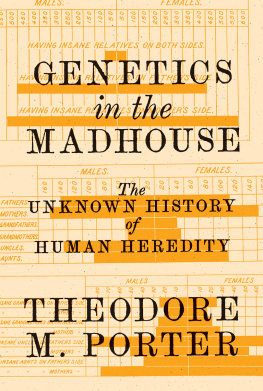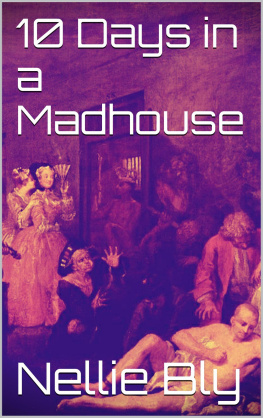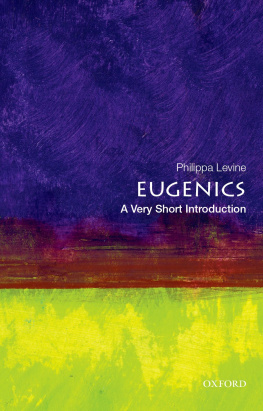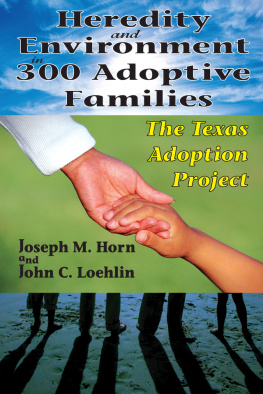GENETICS
IN THE
MADHOUSE
THE
UNKNOWN HISTORY
of
HUMAN HEREDITY
THEODORE
M. PORTER
PRINCETON UNIVERSITY PRESS
Princeton and Oxford
COPYRIGHT 2018 BY PRINCETON UNIVERSITY PRESS
PUBLISHED BY PRINCETON UNIVERSITY PRESS
41 William Street, Princeton, New Jersey 08540
IN THE UNITED KINGDOM: PRINCETON UNIVERSITY PRESS
6 Oxford Street, Woodstock, Oxfordshire OX20 1TR
press.princeton.edu
Jacket image: From a report of the 1880 US census (1888), an early example of graphical representation of asylum statistics, here comparing the prevalence
of hereditary taint of women to that of men and indicating the importance of
different relatives as sources of insanity. From Frederick Howard Wines,
US Census Office, Report on the Defective, Dependent, and Delinquent Classes of
the Population of the United States as Returned at the Tenth Census (June 1, 1880)
[vol. 21 of 1880 census], Washington: Government Printing Office, 1888.
ALL RIGHTS RESERVED
ISBN 978-0-691-16454-0
Library of Congress Control Number: 2018935173
British Library Cataloging-in-Publication Data is available
This book has been composed in Miller and Century Modern
Printed on acid-free paper.
PRINTED IN THE UNITED STATES OF AMERICA
1-3-5-7-9-10-8-6-4-2
GENETICS IN THE MADHOUSE
ILLUSTRATIONS
SOME WORDS OF INTEREST
I use a few old-fashioned, odd, foreign, and, to modern ears, rude words where translation or anachronism demands too much sacrifice of meaning. Here a few that recur.
Alienist. From a French word for madness, this was the name for doctors specializing in madness in English and French (aliniste) until the early twentieth century. The German word was Irrenarzt, literally physician to the errant (or mad).
Anlage. A German word (equivalent to the Danish/Norwegian Anlg) that often appears where English used predisposition. But it suggests a factor underlying the predisposition, and it persisted into the 1940s along with Erbanlage (hereditary factor), as the German word for gene. See also my brief etymological discussion in .
Madness. The oldest and least medicalized word in a cluster of terms. Insanity implied a lack of legal responsibility and usually extended to idiots and imbeciles, while lunacy referred only to the mad. Mental illness is a more medicalized form. These terms were all in use by 1800. Idiot, a very old word with Greek roots, referred to the most extreme intellectual disability. Imbecile was introduced for a less severe form, while feebleminded (often written as feeble-minded) was increasingly used in the late nineteenth century. In Britain, feebleminded referred only to those with modest disabilities, while mental deficiency included the full spectrum. Mental defect usually extended to insanity as well as mental weakness.
Moral treatment refers to a relatively gentle, psychological form of care that emphasized cultivating and manipulating the basic rationality that most patients were said to retain. It inspired great optimism in the early nineteenth century and helped to stimulate the first wave of asylum expansion.
Abbreviations in Text
ABA -American Breeders Association
AJIAmerican Journal of Insanity
AMPAnnales mdico-psychologiques (Medical-Psychological Annals, France)
AZPAllgemeine Zeitschrift fr Psychiatrie (General Journal of Psychiatry, Germany)
ARGBArchiv fr Rassen- und Gesellschaftsbiologie (Archive for Racial and Social Biology, Germany)
ERO Eugenics Record Office
JMSJournal of Mental Science (began as the Asylum Journal of Mental Science)
ZgNPZeitschrift fr die gesamte Neurologie und Psychiatrie (Journal for All of Psychiatry and Neurology, Germany)
INTRODUCTION
Data-Heredity-Madness
A Medical-Social Dream
The plan of the institution, the budget, the rules for its administration were not calculated merely to pursue cures for the mentally ill; science itself was also to be advanced.
Report of a Rhine Asylum Committee (1830)
Heredity has an undeniably great importance for mental illness and psychical deficiencies. So it is no accident that attention was focused earlier and more intensely on the inheritance question in psychiatry than in any other area of medicine.
Wilhelm Schallmayer (1918)
Genetics has been supported by compelling images. We think first of DNA, whose helical structure, announced in 1953, is still often exalted as the secret of life. For half a century before that, the science of heredity was identified with neat diagrams of green and yellow or smooth and wrinkled peas bred by Gregor Mendel in the garden of an Augustinian monastery.schools for children who were called feebleminded. DNA does not flow gracefully in unbounded space but is bent and twisted to fit onto stubby chromosomes. The science of human heredity arose first amid the moans, stench, and unruly despair of mostly hidden places where data were recorded, combined, and grouped into tables and graphs.
In practice, human genetics has always depended on mundane tools to classify and record bodily traits. Phenotypic heredity, which deals in quantities such as egg or milk production, IQ scores, and medical conditions, persists alongside the analysis of genetic factors that may be supposed to code for such traits. Its importance for breeding and other practical endeavors was and remains much greater than is commonly realized. Statistical techniques, from ordered lists and correlation tables to regressions and cluster analysis, have been fundamental to both sorts of hereditary research, genotypic and phenotypic. The public knows little of this. A bitter debate in the early twentieth century between biometricians and Mendelians about how best to study biological inheritance seemed to end in a victory for genetics, defined by a focus on discrete nuggets of hereditary causation for which Wilhelm Johannsen in 1909 coined the term gene. The new genetics emphasized microscopy, agricultural breeding, and model organisms. Despite geneticists intense engagement with eugenics and medicine, Homo sapiens was not their preferred organism. It was too resistant to laboratory manipulation and had too long a generation time in comparison to fruit flies, nematodes, and viruses. Historians of genetics, until recently, almost always echoed laboratory scientists and breeders in their focus on genes and then DNA.
This book brings historical focus to that other science of heredity, the tradition of amassing, ordering, and depicting data of biological inheritance, especially in humans. The deployment of hereditary data in medical and social institutions preceded academic genetics by about a century and continued thereafter as a set of tools and approaches loosely interwoven with classical genetic methods and understandings. In the dance of influence and appropriation, data work was never a passive partner, and in recent decades it
These provided my inspiration for taking up this work. Karl Pearson, the subject of my previous book, combined extraordinarily wide-ranging intellectual ambitions with an unwavering commitment to statistics, eugenics, and scientific method. He also took data to be highly diverse and even personal. An invitation to contribute to an edited volume on the history of heredity prompted me to suppose that an inquiry into the sources of Pearsons data might open up broader cultural dimensions. I found that experts on the treatment of the insane and feebleminded in 1910 were not sleepily awaiting the magic touch of a geneticist or statistician to give meaning and purpose to their data. For decades already, asylum doctors had regarded themselves as medical scientists, and they took a vital interest in the role of heredity in reproducing the conditions they treated. My discovery of these efforts recapitulated Pearsons own, as the institutions he looked to for data turned into sites of collaboration. Right from the start, his journal







